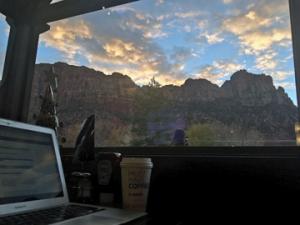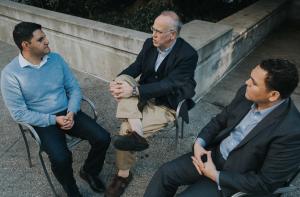Recently, over at Christianity Today, Tim Keller (pastor of New York City’s Redeemer Presbyterian Church) talked with Andy Crouch about work and faith and lots of other things. It’s well worth a read.
One piece stood out to me:
One thing emerging adults say sometimes is a further step from what we’re talking about: “I hate my job. It’s not just like I don’t have a lot of power—I really can’t stand what I have to do every day.” How would you pastor someone in that situation?
I hear that a lot.
What I usually say is, you have to learn the ropes of your profession. I say, “Look, you need to spend some time earning your spurs, getting some street cred, getting to know the relationships. Otherwise you’re not going to be able to function in this field in a way that you think is more values driven.” You basically pay your dues as long as you’re not being asked to violate your conscience. If you’re doing a lot of stuff that’s just useless, it’s only useless in the short term because in the long term you might be getting skills with which you might help people. You can go to a better company or start your own, but for a period of time, if you get too squeamish about doing useless stuff, you may never get good in your field at all. You’ll never be salt and light in it later.
This is something I’ve had to come to terms with slowly. For the first few years of my own career, I worked in technology and finance—and I hated it. I eventually got out, and I know that was the right decision.
But at the time I justified my career jump by saying, I’m just so unhappy there. At its core, my decision to leave my previous jobs had to do with my state of happiness, and that was it.
Now of course, if you’re miserable in your job, it doesn’t mean you don’t leave. But because that was my motivation, I found that I had developed the habit of thinking I ought to leave any job as soon as things got tough. That when I was unhappy because I was doing silly, useless, grindingly boring or laborious work, it was an indicator that I should go.
What I’ve realized is that every job and every bit of work has grindingly boring moments. For instance, teachers have to grade (thus giving rise to the old joke, “they pay me to grade—I’d teach for free”). Writing is as much about proofreading and editing as it is about crafting characters. There’s always an expense report to fill out. When you cook, someone’s got to wash the dishes.
Every occupation has moments that make you miserable because, as Keller points out, you’ve got to not be squeamish about “useless stuff.” Sometimes I find myself telling students in my office—students who expect (and unfortunately, the adults in their life, including their professors, have often inadvertently put this in their head) that they’ll skip the grind because they’re smart and talented and got a good education. But I have to say that it might be decades before that happens—and it never goes away.
I’ve come to believe that if you like your work about half the time, if you like about half the people you work with, and if you wake up half the time feeling good about going to work, then that’s a great baseline. I’m lucky that a lot of the time, I like it all a great deal more than half the time. But it’s not the hard, boring work that should turn us away—rather, that hard, dull, boring work should turn us into the kind of people who are ready to stick with it for the long haul.











